On and Off the Hill
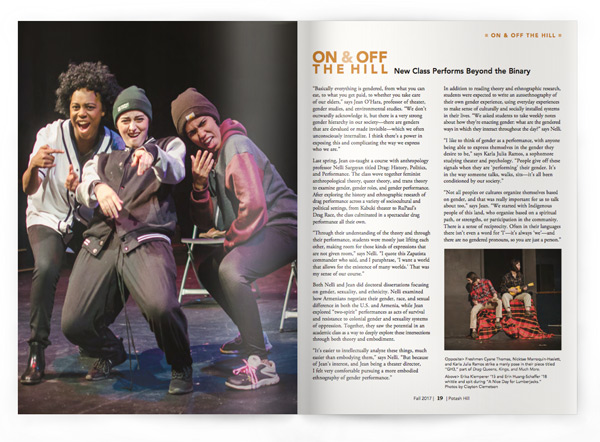
New Class Performs Beyond the Binary
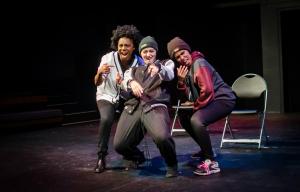 “Basically everything is gendered, from what you can eat, to what you get paid, to whether you take care of our elders,” says Jean O’Hara, professor of theater, gender studies, and environmental studies. “We don’t outwardly acknowledge it, but there is a very strong gender hierarchy in our society—there are genders that are devalued or made invisible—which we often unconsciously internalize. I think there’s a power in exposing this and complicating the way we express who we are.”
“Basically everything is gendered, from what you can eat, to what you get paid, to whether you take care of our elders,” says Jean O’Hara, professor of theater, gender studies, and environmental studies. “We don’t outwardly acknowledge it, but there is a very strong gender hierarchy in our society—there are genders that are devalued or made invisible—which we often unconsciously internalize. I think there’s a power in exposing this and complicating the way we express who we are.”
Last spring, Jean co-taught a course with anthropology professor Nelli Sargsyan titled Drag: History, Politics, and Performance. The class wove together feminist anthropological theory, queer theory, and trans theory to examine gender, gender roles, and gender performance. After exploring the history and ethnographic research of drag performance across a variety of sociocultural and political settings, from Kabuki theater to RuPaul’s Drag Race, the class culminated in a spectacular drag performance all their own.
“Through their understanding of the theory and through their performance, students were mostly just lifting each other, making room for those kinds of expressions that are not given room,” says Nelli. “I quote this Zapatista commander who said, and I paraphrase, ‘I want a world that allows for the existence of many worlds.’ That was my sense of our course.”
Both Nelli and Jean did doctoral dissertations focusing on gender, sexuality, and ethnicity. Nelli examined how Armenians negotiate their gender, race, and sexual difference in both the U.S. and Armenia, while Jean explored “two-spirit” performances as acts of survival and resistance to colonial gender and sexuality systems of oppression. Together, they saw the potential in an academic class as a way to deeply explore these intersections through both theory and embodiment.
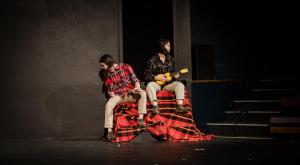 “It’s easier to intellectually analyze these things, much easier than embodying them,” says Nelli. “But because of Jean’s interest, and Jean being a theater director, I felt very comfortable pursuing a more embodied ethnography of gender performance.”
“It’s easier to intellectually analyze these things, much easier than embodying them,” says Nelli. “But because of Jean’s interest, and Jean being a theater director, I felt very comfortable pursuing a more embodied ethnography of gender performance.”
In addition to reading theory and ethnographic research, students were expected to write an autoethnography of their own gender experience, using everyday experiences to make sense of culturally and socially installed systems in their lives. “We asked students to take weekly notes about how they’re enacting gender: what are the gendered ways in which they interact throughout the day?” says Nelli.
“I like to think of gender as a performance, with anyone being able to express themselves in the gender they desire to be,” says Karla Julia Ramos, a sophomore studying theater and psychology. “People give off these signals when they are ‘performing’ their gender. It’s in the way someone talks, walks, sits—it’s all been conditioned by our society.”
“Not all peoples or cultures organize themselves based on gender, and that was really important for us to talk about too,” says Jean. “We started with Indigenous people of this land, who organize based on a spiritual path, or strengths, or participation in the community. There is a sense of reciprocity. Often in their languages there isn’t even a word for ‘I’—it’s always ‘we’—and there are no gendered pronouns, so you are just a person.”
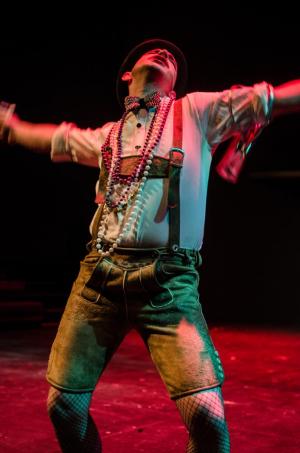 That kind of selfless collaboration and gender complexity was very evident in the class’s much anticipated April performance, titled Drag Queens, Kings, and Much More. Far from reinforcing the typical gender binary, and its inherent sexism, the show invited the audience to expand their understanding of gender expression through a series of very touching and personal acts. Performed once in Whittemore Theater and once at Hooker Dunham Theater in Brattleboro, the performance was a benefit for Green Mountain Crossroads, a nonprofit organization serving the local LGBTQ community.
That kind of selfless collaboration and gender complexity was very evident in the class’s much anticipated April performance, titled Drag Queens, Kings, and Much More. Far from reinforcing the typical gender binary, and its inherent sexism, the show invited the audience to expand their understanding of gender expression through a series of very touching and personal acts. Performed once in Whittemore Theater and once at Hooker Dunham Theater in Brattleboro, the performance was a benefit for Green Mountain Crossroads, a nonprofit organization serving the local LGBTQ community.
“By putting myself out there for the first time in my community and performing as a drag queen, let alone my first performance ever, I believe I was able to tap into my ability to produce a lasting effect,” says sophomore Day Rodriquez. “The audience’s support enhanced my confidence, and it was eye-opening to see my physical transformation unfold before my own eyes.” Day wrote an editorial for the Huffington Post about his experience: goo.gl/xEUAai.
“My favorite part of the drag show by far was that I was able to express myself and perform something I like to do—which is dancing—and to learn about myself in the process,” says sophomore Cyane Thomas. She is studying Korean popular culture and finds that gender performance plays a huge role in “K-Pop.” “The show and the class both made me realize that gender is expressed by individuals themselves, not by what society assigns.”
The production was co-created by all the performers, including Nelli and Jean, in an ensemble fashion. The students wrote scripts, choreographed movement, chose music, and determined the message they wanted to convey. Each student was involved in three or four acts, ranging from an interrogation of Bond-style “gentleman killers,” titled “007 Shakin’ & Stirred,” to an examination of gender, intercultural challenges, sexism, and the directions to Costco. There was humor, sadness, irony, and a sense of limitless possibilities.
“Not one of the pieces put anyone down or claimed power at the expense of someone else,” says Nelli, whose act with Jean in day-glow pantsuits, called “Otta Love,” was reprised on demand at the senior dinner before commencement.
“It was really amazing how many people said this was their favorite Marlboro show ever, because it wasn’t this polished piece,” says Jean. “I think it speaks to our desire, all of us, to see gender represented in a less heteronormative, binary way, to see something that is within us reflected back, even if we don’t get to express it—to live in a world with much more interesting, beautiful, layered, complex ways of expressing ourselves.” See an excerpt of the show.
Speech Matters Addresses Life after Incarceration
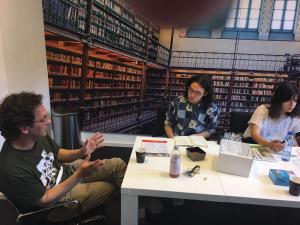 Following on its highly acclaimed first semester intensive in fall 2015 (Potash Hill, Fall 2015), Speech Matters returned this spring to focus on criminal justice reform. This year’s program looked at how politicians, social service providers, community members, and the recently incarcerated talk about responsibility, redemption, and the opportunity to move forward.
Following on its highly acclaimed first semester intensive in fall 2015 (Potash Hill, Fall 2015), Speech Matters returned this spring to focus on criminal justice reform. This year’s program looked at how politicians, social service providers, community members, and the recently incarcerated talk about responsibility, redemption, and the opportunity to move forward.
“The first iteration of Speech Matters focused on addiction and how rural and urban communities were dealing with the opioid epidemic,” says Meg Mott, politics professor and director of the semester intensive. “Some of the activists we met were in law enforcement and some had been formerly incarcerated—it made sense to broaden our network of partners into the criminal justice system.”
Each year, more than 700,000 individuals are released from prison, and another 9 million are sent home from local jails. Within three years, chances are strong that each of these individuals will re-offend and find themselves back in jail, suggesting that the school-to-prison pipeline only works in one direction. Together, Speech Matters students explored ways to improve the chances for those who have served their time.
“We front-loaded the theory,” says Jeff Hiam, a junior who participated in the semester. “We started out with reading Foucault—if you haven’t read that, it’s something else— and then read The New Jim Crow: Mass Incarceration in the Age of Colorblindness. That book really changed the national discourse on criminal justice, and it had a tremendous effect on me.”
In addition to looking at principles behind the various political arguments—libertarian, liberal, and conservative—students did much of their learning outside of the classroom, visiting correctional facilities and advocacy groups in Vermont, New Hampshire, Connecticut, and New York City.
“Since we were meeting with very different constituents— superintendents, formerly incarcerated leaders, defense attorneys, advocates—we were forced to hold some fairly significant differences of opinion in our collective imagination,” says Meg. “The classroom became a place to hold those differences without collapsing them into simplistic categories of ‘good’ and ‘bad.’ That’s a hard thing to do, especially when sharp judgment seems so helpful to the cause.”
The semester ended with a class trip to Amsterdam to provide students with a cross-cultural comparison and experience. The Netherlands has a much more humane approach to drug use than the United States, including supervised injection facilities known as “consumption rooms,” and has reduced the risk of overdose as well as the number of people going to prison. Many clients are non-Dutch nationals, people who would probably be criminalized in their home countries.
“In Amsterdam, we were able to see policy in action that was radically different from what we had seen in the U.S.,” says sophomore Eric Wefald. “People had a different outlook on prisoners and people who use drugs. It was crucial that we heard their stories and saw their practices in person.”
“Perhaps the most important observation was that harm reduction seemed to be part of the approach no matter what issue the individuals and organizations were focusing on,” says anthropology professor Nelli Sargsyan, who led the trip to Amsterdam. “We noticed it in the approach of the chief strategist of the Dutch police, the prison superintendents, the group home for formerly incarcerated people, and MDHG, a user-advocacy organization, to name a few. There seemed to be pragmatism involved in the decision making around these issues that was part of all our interlocutors’ thinking.”
Over the course of the semester, Speech Matters brought a rich program of speakers, films, and performers to Brattleboro to address the issue of mass incarceration, from criminal justice leader Glenn Martin to the renowned Everett Company Freedom Café, an event co-sponsored by Vermont Performance Lab. Their final event was a panel of student presenters talking about their individual projects, ranging from legal responses to intimate and sexual violence to a case study of a re-entry program in New Haven. See an excerpt of a panel discussion by the class.
Marlboro Collaborates with Mexican University
In May, Marlboro College signed a collaboration agreement with the Autonomous University of San Luis Potosí (UASLP), in central Mexico, for academic and research exchanges. The agreement will ensure that future students and faculty from each institution can spend time at the other to conduct research and take courses in their areas of interest.
“The city of San Luis Potosi is a jewel of the Baroque period, and our students will love walking around the plazas and exploring the different natural and geological regions in the area,” says Rosario de Swanson, professor of Spanish language and literature, who was instrumental in making the UASLP agreement a reality. She also found that, like Marlboro, UASLP values interdisciplinary perspectives and curricular innovation. They also offer several programs unavailable at Marlboro, including geography, archaeology, and paleontology.
“This exchange agreement with UASLP offers another exciting opportunity for students to study off the hill,” says Richard Glejzer, provost and dean of faculty. “We have three exchange programs in Europe now (Germany, Czech Republic, and Slovakia) and one in China—this will be our first in Latin America.” Learn more.
College Creates English for Refugees Fellowship
In February, Marlboro College and the U.S. Committee for Refugees and Immigrants (USCRI) signed a partnership to create the English for Refugees Fellowship. This inspiring fellowship will enable students in Marlboro’s MA in Teaching English to Speakers of Other Languages (TESOL) program to serve at one of six resettlement centers in the U.S., and to teach English to refugees and immigrants while completing their graduate degree.
“USCRI is a nationally recognized nonprofit that has worked toward protecting the rights of displaced peoples for over 100 years,” says Beverley Burkett, chair of Marlboro’s MATESOL program. “We are thrilled to be able to collaborate with them and support their mission while training educators who will make a positive contribution. We hope to develop a cohort of teachers who are sensitive to the needs of a population that has experienced the trauma of displacement, who recognize their resiliency, and who will support these people in creating dignified, independent lives in their new homes.”
Marlboro welcomed their first English for Refugees Fellows this summer, and marked their summer residency with a five-part speaker series on refugees in the U.S. The series included eminent authorities on the subject, ranging from Amila Merdzanovic, former refugee and now leader of the USCRI Vermont field office, to Lloyd Dakin, retired senior officer for the UN High Commissioner for Refugees.
Positive Sexuality on Campus
By Robyn Manning-Samuels ’14
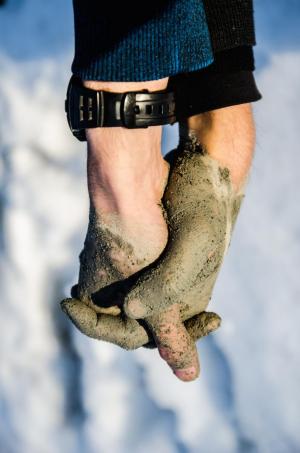 In 2011, the Obama administration issued a “Dear Colleague” letter to schools, colleges, and universities that receive federal funding, with directives for how to interpret Title IX and adjudicate sexual misconduct cases. Among the new regulations were descriptions of how prevention and awareness programs should look, including initiatives “intended to end dating violence, domestic violence, sexual assault, and stalking.” The programs had to be culturally relevant, inclusive of diverse communities and identities, and sustainable, among other admirable criteria.
In 2011, the Obama administration issued a “Dear Colleague” letter to schools, colleges, and universities that receive federal funding, with directives for how to interpret Title IX and adjudicate sexual misconduct cases. Among the new regulations were descriptions of how prevention and awareness programs should look, including initiatives “intended to end dating violence, domestic violence, sexual assault, and stalking.” The programs had to be culturally relevant, inclusive of diverse communities and identities, and sustainable, among other admirable criteria.
One of the major criticisms of the Dear Colleague letter was the capacity of college campuses to meet these new regulations. Many schools have found it hard to divert resources away from adjudicating sexual misconduct cases and supporting survivors to create a more comprehensive prevention and awareness program. Meanwhile, campus prevention efforts are quickly becoming culturally irrelevant as the focus of research moves away from consent as just “yes and no” to a larger conversation that focuses on sexual pleasure, healthy relationships, and healthy communication.
The work I’m doing at Marlboro College is focused on what is quickly becoming the norm among rape prevention specialists and experts: consent as positive sexuality. The philosophy behind positive sexuality is, “All forms of sexuality are healthy and encouraged as long as the expression of that sexuality is consensual.” Reframing consent through the lens of positive sexuality not only meets new federal regulations, but is a missing link in the conversation around sexual assault prevention. Through a positive sexuality lens, we can focus our efforts on helping students navigate the nuances of consent in a meaningful way.
Positive sexuality programs at Marlboro are intentionally designed to educate students on healthy consent and relationships and to create increasingly nuanced conversations around consent. In order to keep the workshops inclusive and open, I hire expert sex educators who are well versed in the myriad ways that intersecting identities affect conversations around consent. The fall semester begins with “Healthy Me,” focusing on the healthy individual, because much of the work around relationships and consent begins with an understanding of personal needs and boundaries. In the spring the conversation shifts to “Healthy Us” and conversations about navigating relationships, partners, and how to be a good bystander in instances of intimate partner violence.
A common criticism of positive sexuality programs is the relative absence of conversations around the violence of sexual assault—a shift away from the history of prevention programs focused on the horror of rape and abuse. An effective positive sexuality program series needs to include “solidarity” events focused on creating space for survivors to voice their experiences, challenge rape culture, and name violent behaviors. This is something Marlboro continues to work on as part of a larger shift away from framing campus events like Take Back the Night as “prevention.” With both prevention and solidarity programs happening simultaneously, college campuses will look very different than they ever have before.
The last crucial piece involves trained peer educators and advocates. At Marlboro, I created a program called the Consent Cavalry, which provides students (and staff and faculty, if they wish) with 25 to 35 hours of education and training to prepare them to be educators, advocates, and resources to their peers. In many ways, the real work is happening in peer-to-peer conversation about sexuality, relationships, and drugs and alcohol. Members of the Consent Cavalry know how to report instances of alleged policy violations, who the resources are on and off campus and how to get in touch with them, and how to be an empathetic responder and active bystander.
Community members like those in the Consent Cavalry are where the real culture shift happens, and it is already starting at Marlboro. Students are being more thoughtful about their habits, seeking out resources when they need them, and having real conversations about consent in their day-to-day lives. With culturally relevant and inclusive programming, in compliance with federal regulations, positive sexuality could become the new norm in the conversation around consent and relationships; students could be taught to swim instead of being told not to drown. This is how you change culture, and this is how you truly prevent sexual assault.
Robyn Manning-Samuels is senior coordinator of sexual respect and wellness, and survivor advocate, at Marlboro College.
Also of Note
 “It’s a great opportunity, especially if the graduate school has a program that could relate to a student’s Plan, or even just help them along with their future,” says Cat Clauss ’17 (right), the first undergraduate to enroll in the new accelerated master’s track. Cat, who did her Plan in the psychology of career development, will continue to earn her MSM, with a concentration in mission-driven organizations, this fall. The accelerated master’s track can also lead to MAT degrees in TESOL, ed tech, and social justice, as well as an MBA. Learn more at goo.gl/P4gu9r.
“It’s a great opportunity, especially if the graduate school has a program that could relate to a student’s Plan, or even just help them along with their future,” says Cat Clauss ’17 (right), the first undergraduate to enroll in the new accelerated master’s track. Cat, who did her Plan in the psychology of career development, will continue to earn her MSM, with a concentration in mission-driven organizations, this fall. The accelerated master’s track can also lead to MAT degrees in TESOL, ed tech, and social justice, as well as an MBA. Learn more at goo.gl/P4gu9r.
Sophomore Cyane Thomas spent most of the summer in Seoul, South Korea, learning Korean and taking a course about the globalization of K-pop. “It’s super exciting because the classes fall in perfectly with what I plan to study at Marlboro, which is Korean pop music,” she says. A highlight was going to a music television show to watch various K-pop groups perform and promote their most recent musical releases. “I was excited to see these individuals sing and dance their hearts out with my own eyes instead of on a screen.” Learn more about Cyane’s work at goo.gl/rrnuGj.
Marlboro College made the short list for “10 colleges where joining student clubs is easy,” released in February by U.S. News and World Report. Drawn from U.S. News’ survey of more than 1,800 colleges and universities nationally, Marlboro is the only New England college in the top 10, tieing second with Hamilton College in New York State. “Since the typical club at these colleges had fewer than 10 people, the odds are higher that club members will get to know each other than at colleges where clubs are larger,” said the article.
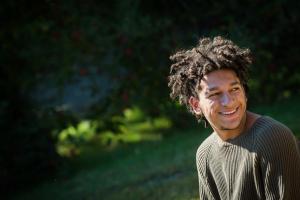 “It was such a privilege to live and study in a place whose beauty is so immediately apparent yet so enigmatic,” says junior Andrew Domzal (right), who studied abroad last semester at Charles University in Prague, Czech Republic. Andrew was the first student to participate in Marlboro’s exchange program with Charles, where he studied philosophy and film. “There is something about a change of atmosphere that I believe to be essential, not just to philosophical or academic growth, but to the cultivation of the self. As I prepare myself for Plan, I can’t think of an experience that would have given me the same gifts that my time in Prague did.”
“It was such a privilege to live and study in a place whose beauty is so immediately apparent yet so enigmatic,” says junior Andrew Domzal (right), who studied abroad last semester at Charles University in Prague, Czech Republic. Andrew was the first student to participate in Marlboro’s exchange program with Charles, where he studied philosophy and film. “There is something about a change of atmosphere that I believe to be essential, not just to philosophical or academic growth, but to the cultivation of the self. As I prepare myself for Plan, I can’t think of an experience that would have given me the same gifts that my time in Prague did.”
On March 8, Marlboro students, faculty, and staff participated in a walk-out in solidarity with “A Day Without Women.” Participants gathered in the Snyder Gallery at noon to appreciate Diane Heileman’s Women’s March exhibit and to hear poems, quotes, and statistics about women’s empowerment and pay equity. Community members were then invited to visit a table in the dining hall where they could donate to the Women’s Freedom Center and fill out postcards to be sent to victims of hate crimes via the Local Love Brigade.
“The other coaches were definitely impressed by our talent and potential,” says Brennan Cofiell, a student in the MA in Teaching for Social Justice program and co-coach of the Twin Valley High School snowboard team. The team was featured in a Febuary Deerfield Valley News article, highlighting their strong season after four years without a team. Brennan is student teaching social studies at Twin Valley, in the classroom of co-coach Scott Salway. “I have always loved teaching,” says Brennan. “I have recently stepped away from working full time at the mountain and am working on my MAT.”
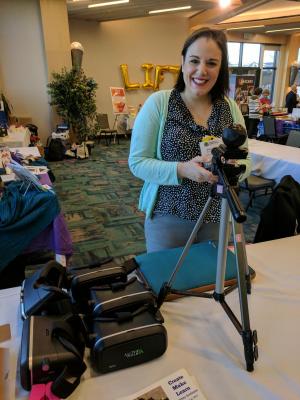 Teaching with Technology student Erica Zimmer (right) presented what her students were doing in virtual reality at May’s Dynamic Landscapes conference in Burlington, Vermont. “I was able to secure a grant to build a Makerspace at one of my schools, and I used part of the money to buy a 360 Camera and VR Goggles,” says Erica, a technology integration specialist in Rutland. Two girls used CoSpaces to build virtual reality spaces, one about wolves and the other about horses. “The next thing I know, their objects are moving around in their spaces, something that requires a bit of programming. They had taught themselves how to code!”
Teaching with Technology student Erica Zimmer (right) presented what her students were doing in virtual reality at May’s Dynamic Landscapes conference in Burlington, Vermont. “I was able to secure a grant to build a Makerspace at one of my schools, and I used part of the money to buy a 360 Camera and VR Goggles,” says Erica, a technology integration specialist in Rutland. Two girls used CoSpaces to build virtual reality spaces, one about wolves and the other about horses. “The next thing I know, their objects are moving around in their spaces, something that requires a bit of programming. They had taught themselves how to code!”
“Decadent chords cut through, creating a wild, untamed haze which is the foundation for Wild Rose,” said the Valley Advocate, in an admiring review of the new album of music by senior Bella Ortiz-Wren. Released on Bandcamp in April, Wild Rose is an astute exploration of “our physical selves inspiring emotions,” according to reviewer Will Meyer. “The album is wise beyond Ortiz-Wren’s 21 years, but also makes sense within this context as well. The investigation of bodies, aspirations, and limits is certainly age-appropriate— questions and quandaries that can linger a lifetime.” Learn more at goo.gl/r7bVL5.
Congratulations to Marceline Mitchell ’17, who was awarded this year’s “Check Me Out” award for checking out the most books from the library. “I spent so much time in the library, definitely more than any other building on campus—my dorm included—so the award was a really cool thing for me,” says Marceline, whose Plan in politics and philosophy was “An Exploration of the Making and Unmaking of the Democratic Subject.” She said she had 166 books checked out at the end of the semester, and estimates she checked out twice that many over the course of the year.
Mad Tea Party 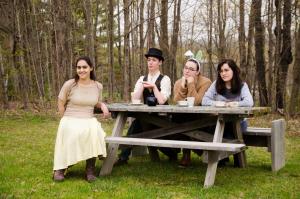 Seniors Phoebe Okoomian and John Marinelli, Lindsay Stevens ’17, and sophomore Cary Russell take five during the filming of Phoebe’s dance adaptation of Alice’s Adventures in Wonderland. Photo by Clayton Clemetson
Seniors Phoebe Okoomian and John Marinelli, Lindsay Stevens ’17, and sophomore Cary Russell take five during the filming of Phoebe’s dance adaptation of Alice’s Adventures in Wonderland. Photo by Clayton Clemetson
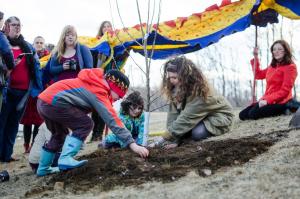 New Beginnings
New Beginnings
In April, the graduate programs officially joined the main campus in Marlboro, marking the new co-location with a ceremony including a dragon dance, gift giving, and tree planting. Photo by Clayton Clemetson
Taking Action
Claire Wheeler MBA ’14 checks in on a group discussion about curricular innovation, part of the Action Planning Process that was launched last summer to include faculty, staff, and students in putting our best ideas forward.
Student Power
On April 12, Work Day included installing a solar panel on the Outdoor Program barn to power a new electric-assist, compost-toting tricycle, along with the usual splitting wood, trimming apple trees, building benches, and picking up trash.
Sexual Respect
In February, the college convened a community discussion on Title IX policy, featuring a panel of specialists, from left to right: Chantelle Cleary (SUNY Albany Title IX coordinator), Jean Kiewel (Title IX coordinator), Jeff Nolan (attorney), Robyn Manning-Samuels (senior coordinator of sexual respect and wellness), Max Foldeak (director of health services), and Meg Mott (professor of politics).
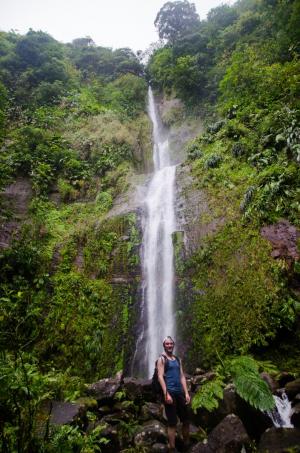 Tropical Paradise
Tropical Paradise
Senior Iain Haukka pauses by a waterfall during an Outdoor Program trip to Guadeloupe, in the Caribbean’s Leeward Islands, during Spring Break last March. Photo by Clayton Clemetson
Events
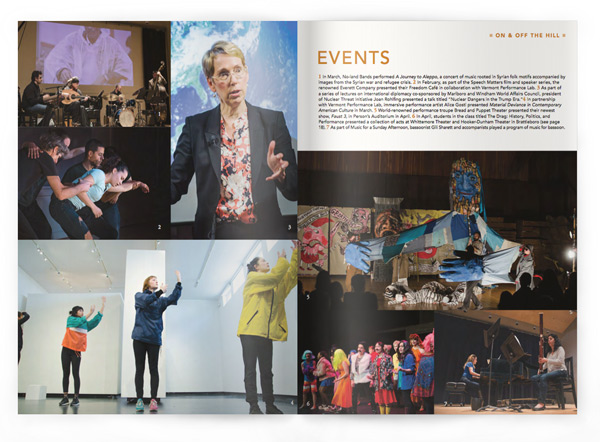
1 In March, No-land Bands performed A Journey to Aleppo, a concert of music rooted in Syrian folk motifs accompanied by images from the Syrian war and refugee crisis. 2 In February, as part of the Speech Matters film and speaker series, the renowned Everett Company presented their Freedom Café in collaboration with Vermont Performance Lab. 3 As part of a series of lectures on international diplomacy co-sponsored by Marlboro and Windham World Affairs Council, president of Nuclear Threat Initiative Joan Rohlfing presented a talk titled “Nuclear Dangers in the Trump Era.” 4 In partnership with Vermont Performance Lab, immersive performance artist Alice Gosti presented Material Deviance in Contemporary American Culture in March. 5 World-renowned performance troupe Bread and Puppet Theater presented their newest show, Faust 3, in Person’s Auditorium in April. 6 In April, students in the class titled Drag: History, Politics, and Performance presented a collection of acts at Whittemore Theater and Hooker-Dunham Theater in Brattleboro. 7 As part of Music for a Sunday Afternoon, bassoonist Gili Sharett and accompanists played a program of music for bassoon.
Focus on Faculty

Faculty Q&A
Last February, junior Emmett Wood sat down with music professor Matan Rubinstein to discuss composition, collaborating with students, and leading pop bands in the Israeli army. You can read the whole interview.
EMMETT WOOD: How would you characterize your early career in music?
MATAN RUBINSTEIN: I began at a very young age, playing piano. I got my first professional engagement around age 16. Then there was the army. In Israel, it’s a mandatory service of three years. I was an arranger for the army band, which is probably the least combatant job you could have in the army. The Israeli army has these small groups that go to entertain the troops, and so my job was to write arrangements and rehearse with those groups. It was really a ridiculous job. In a very, very loose sense, I’m a veteran.
E: Have you been composing recently?
M: I’m active all the time: I compose and I play. I just finished a commission for a solo cello piece, but I’ve done some music for dance. Two years ago I scored a documentary film soundtrack. So I’ve been doing music for film and dance. I never really stop.
E: And you’re always working with Plan students?
M: Yeah, improvisation, electronic music, some sound design.
E: What do you like about working with Marlboro students?
M: My favorite aspect of working with people here is how enthusiastic and open-minded they are—this is almost without exception. People come here and they are open to unorthodox ideas, and when that is coupled with discipline it’s really a remarkably good experience teaching here. It’s never dull. I get to hear thoughts that I never would have thought of myself, which is always a gift.
Focus on Faculty
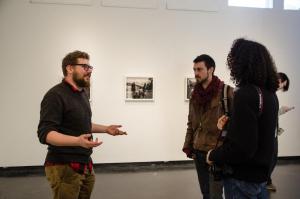 Professor of religion Amer Latif gave a talk at the June annual meeting of the Windham World Affairs Council titled “An Islamic Christmas Tree: Insights from Cognitive Science on Making Peace.” His presentation outlined a way to forge a rigorous method for making peace, at a deep level, between apparent religious contradictions—a way of finding harmony and unity that accommodates difference and multiplicity. Amer also discussed how this method appears from the perspective of contemporary cognitive science on the nature of human understanding. He is currently working on a book titled “Only God is Good”: Islam in the Words of Jesus.
Professor of religion Amer Latif gave a talk at the June annual meeting of the Windham World Affairs Council titled “An Islamic Christmas Tree: Insights from Cognitive Science on Making Peace.” His presentation outlined a way to forge a rigorous method for making peace, at a deep level, between apparent religious contradictions—a way of finding harmony and unity that accommodates difference and multiplicity. Amer also discussed how this method appears from the perspective of contemporary cognitive science on the nature of human understanding. He is currently working on a book titled “Only God is Good”: Islam in the Words of Jesus.
In May, retiring writing and literature teacher T. Hunter Wilson regaled students, faculty, and other admirers in the library reading room with a retrospective reading of his work. Ominously titled “The Final Reading,” the event featured some prose, including essays about his travels in Vietnam and Laos, but mostly poems, including old, recent, and new work.
Management co-chair Lori Hanau was thrilled to interview Anahita Joon Tehrani in support of the transformational coach’s project to convene a “new women’s movement” as a global virtual summit. “It has been my deep privilege to be part of a project that seeks to bring forth the nurturing powers of the sacred feminine to heal and unite, during a time when separation and fear are dominating our airwaves,” says Lori. Her interview, titled “The Undefended Heart: Upgrading Our Humanity through Shared Leadership,” is part of a series available by donation (all proceeds go toward ending human trafficking and slavery) at thenewwomensmovement.com.
In February, the faculty convened an Indigenous Voices in Mesoamerica panel, a presentation and discussion about indigenous stories from Mexico, Guatemala, and Belize. The panel featured Spanish language and literature professor Rosario de Swanson, anthropology professor (emeritus) Carol Hendrickson, theater professor Jean O'Hara, and senior Trevor Avery, and was followed by a Mesoamerican-themed community dinner.
“In many ways, this task of developing engaged citizens echoes the quintessential role of higher education: developing lifelong learners,” says President Kevin Quigley in an April Huffington Post editorial titled “Citizenry Is Learned and Earned.” Kevin touts the essential role of higher education— specifically liberal arts colleges and universities—in ensuring that graduates become engaged citizens, and the importance of such citizens in the continued viability of our democracy. “At Marlboro College, citizen engagement is in our DNA. It is who we are and what we do.” Read more.
Photography professor John Willis has embarked on a collaborative project to create a new photo book on the Standing Rock Tribe’s movement against the Dakota Access Pipeline and on Oceti Sakowin Camp. Building on his own images from several visits to the camp, John is hoping to collect contributions of photos and voices of Native Americans, and to edit the book with a Native American contributor. “I hope the book will honor the indigenous- led movement, and we can represent the concept of working together in a new way while respecting the value of the Native-led approach to the movement,” said John. Learn more at jwillis.net.
In March, graduate faculty member and founder of the Women’s Leadership Circles program Kerry Secrest helped facilitate an open meeting in Brattleboro on the Vermont Equal Pay Compact, the employer pledge to close the gender wage gap. Also a member of the Vermont Commission on Women, Kerry was joined by Cary Brown, executive director of the Vermont Commission on Women, and Jackie Cook, of the Department of Labor’s Women’s Bureau. Marlboro College is a proud signatory of the Equal Pay Compact.
In April, philosophy professor William Edelglass gave a lecture for Earth Day at the University of Utah. He also recently gave a series of public lectures on the history of the concept of race. This summer, William gave a commencement address at his alma mater, St. John’s College, in Sante Fe. Among his publications this year is “Buddhism, Happiness, and the Science of Meditation,” in Meditation, Buddhism, and Science, edited by David L. McMahan and Erik Braun, published by Oxford University Press. Working with collaborators in Brattleboro, William recently received a $150,000 matching grant from the National Endowment for the Humanities to build community through humanities work.
“Through the retelling of her story, the poet claims blackness and African roots as pillars of Peruvian culture,” says Spanish language and literature professor Rosario de Swanson, referring to Afro-Peruvian writer Nicomedes Santa Cruz. Rosario published an article on Santa Cruz’s poem “Ritmos Negros del Perú” in a recent issue of Hispania, the flagship journal of the American Association of Teachers of Spanish and Portuguese. In her article, she argues that the poem opens the door for the “decolonization of Peruvian history and culture.” Meanwhile, Rosario was elected for appointment to the AP Spanish Literature and Culture Development Committee for Educational Testing Service (ETS), where she works during the summer.
In April, Marlboro screened the documentary Jim: The James Foley Story, followed by a discussion and Q&A by visiting politics professor Clare Gillis. The film tells the story of American photojournalist James Foley, who was kidnapped in Syria in 2012 and went missing for two years before the infamous video of his public execution sent shockwaves and introduced much of the world to ISIS. Clare is one of Foley’s journalist colleagues featured in the film, which includes intimate interviews with Jim’s family, friends, and other fellow journalists. She and Foley became close friends in 2011, when they were detained together in Libya by the Gaddafi regime. In July, Clare also gave a talk titled “Refugeehood from World War II until the Present,” part of a five-part series on refugees in the U.S., sponsored by the MA in TESOL program.
A special concert in the Music for a Sunday Afternoon series in April featured the compositions of retiring music professor Stan Charkey, the Luis C. Batlle Chair in Music and the driving force behind the venerable series. On the eve of his retirement, this retrospective program of Stan’s works was performed by friends, family, and colleagues Andrew Eng (violin and viola), Anya Shemetyeva Merfeld (viola), Jake Charkey (cello), Paul Cohen (cello), Greg Jukes (percussion), and fellow Marlboro professor Matan Rubinstein (piano). Over the years, many of these works premiered in Paris, Los Angeles, and Washington, and of course Marlboro.
“We come together as poets, novelists, short-story writers, memoirists. We are writers together, regardless of the experiences that brought us here,” says John Sheehy, professor of writing and literature. He reflects on Marlboro’s Summer Writing Intensive in his editorial “Taking the Fight to the Page,” which appeared in a January issue of The Chronicle of Higher Education. John has led the Summer Writing Intensive, geared toward bringing together veterans as well as civilians through the art of writing, since 2014. “Many of the veterans write about war, but not all of them,” Sheehy says. “So do many of the civilians.… We are writers together, regardless of the experiences that brought us here.” Read more.
Marlboro was the first college in Vermont to be included in a Google Expeditions college tour, allowing prospective college students to experience virtual visits to campuses across the U.S., thanks to the efforts of Caleb Clark, chair of the Teaching with Technology program. “Now Marlboro can be visited virtually by those who may not have the opportunity to make the trip in person, by using smartphones or tablets to ‘look around’ our beautiful campus and read about key points of interest,” said Caleb. He received a grant from Google, which provided a 360-degree camera kit to capture the campus. Learn more.
Student Art
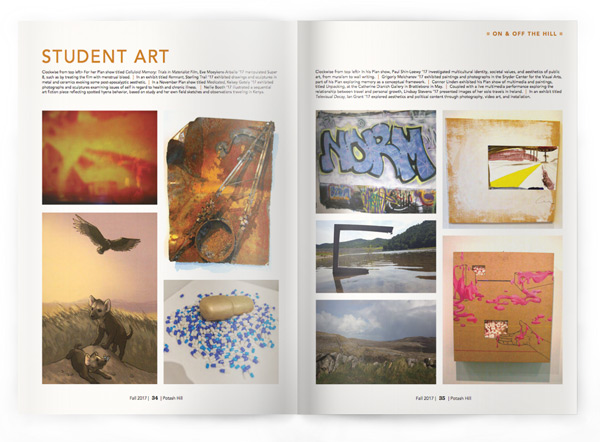
Left page, clockwise from top left> For her Plan show titled Celluloid Memory: Trials in Materialist Film, Eve Moeykens-Arballo ’17 manipulated Super 8, such as by treating the film with menstrual blood. | In an exhibit titled Remnant, Sterling Trail ’17 exhibited drawings and sculptures in metal and ceramics evoking some post-apocalyptic aesthetic. | In a November Plan show titled Medicated, Kelsey Gately ’17 exhibited photographs and sculptures examining issues of self in regard to health and chronic illness. | Nellie Booth ’17 illustrated a sequential art fiction piece reflecting spotted hyena behavior, based on study and her own field sketches and observations traveling in Kenya.
Right page, clockwise from top left> In his Plan show, Paul Shin-Loewy ’17 investigated multicultural identity, societal values, and aesthetics of public art, from muralism to wall writing. | Grigoriy Molchanov ’17 exhibited paintings and photographs in the Snyder Center for the Visual Arts, part of his Plan exploring memory as a conceptual framework. | Connor Linden exhibited his Plan show of multimedia and paintings, titled Unpacking, at the Catherine Dianich Gallery in Brattleboro in May. | Coupled with a live multimedia performance exploring the relationship between travel and personal growth, Lindsay Stevens ’17 presented images of her solo travels in Ireland. | In an exhibit titled Televisual Decay, Ian Grant ’17 explored aesthetics and political content through photography, video art, and installation.
2017 Commencement
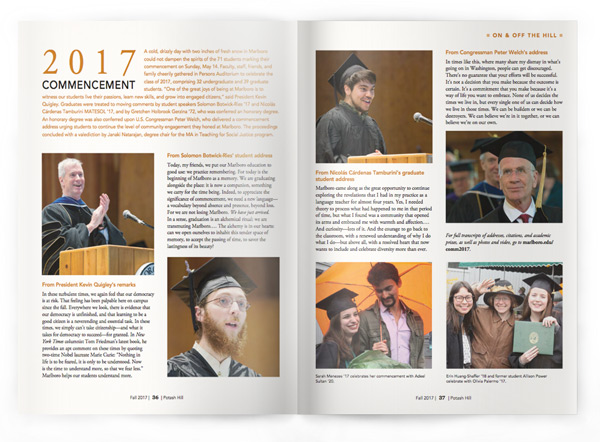
A cold, drizzly day with two inches of fresh snow in Marlboro could not dampen the spirits of the 71 students marking their commencement on Sunday, May 14. Faculty, staff, friends, and family cheerily gathered in Persons Auditorium to celebrate the class of 2017, comprising 32 undergraduate and 39 graduate students. “One of the great joys of being at Marlboro is to witness our students live their passions, learn new skills, and grow into engaged citizens,” said President Kevin Quigley. Graduates were treated to moving comments by student speakers Solomon Botwick-Ries ’17 and Nicolás Cárdenas Tamburini MATESOL ’17, and by Gretchen Holbrook Gerzina ’72, who was conferred an honorary degree. An honorary degree was also conferred upon U.S. Congressman Peter Welch, who delivered a commencement address urging students to continue the level of community engagement they honed at Marlboro. The proceedings concluded with a valediction by Janaki Natarajan, degree chair for the MA in Teaching for Social Justice program.
From President Kevin Quigley’s remarks
In these turbulent times, we again feel that our democracy is at risk. That feeling has been palpable here on campus since the fall. Everywhere we look, there is evidence that our democracy is unfinished, and that learning to be a good citizen is a neverending and essential task. In these times, we simply can’t take citizenship—and what it takes for democracy to succeed—for granted. In New York Times columnist Tom Friedman’s latest book, he provides an apt comment on these times by quoting two-time Nobel laureate Marie Curie: “Nothing in life is to be feared, it is only to be understood. Now is the time to understand more, so that we fear less.” Marlboro helps our students understand more.
From Solomon Botwick-Ries’ student address
Today, my friends, we put our Marlboro education to good use: we practice remembering. For today is the beginning of Marlboro as a memory. We are graduating alongside the place: it is now a companion, something we carry for the time being. Indeed, to appreciate the significance of commencement, we need a new language— a vocabulary beyond absence and presence, beyond loss. For we are not losing Marlboro. We have just arrived. In a sense, graduation is an alchemical ritual: we are transmuting Marlboro.… The alchemy is in our hearts: can we open ourselves to inhabit this tender space of memory, to accept the passing of time, to savor the lastingness of its beauty?
From Nicolás Cárdenas Tamburini’s graduate student address
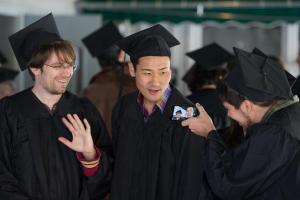 Marlboro came along as the great opportunity to continue exploring the revelations that I had in my practice as a language teacher for almost four years. Yes, I needed theory to process what had happened to me in that period of time, but what I found was a community that opened its arms and embraced me with warmth and affection.… And curiosity—lots of it. And the courage to go back to the classroom, with a renewed understanding of why I do what I do—but above all, with a resolved heart that now wants to include and celebrate diversity more than ever.
Marlboro came along as the great opportunity to continue exploring the revelations that I had in my practice as a language teacher for almost four years. Yes, I needed theory to process what had happened to me in that period of time, but what I found was a community that opened its arms and embraced me with warmth and affection.… And curiosity—lots of it. And the courage to go back to the classroom, with a renewed understanding of why I do what I do—but above all, with a resolved heart that now wants to include and celebrate diversity more than ever.
From Congressman Peter Welch’s address
In times like this, where many share my dismay in what’s going on in Washington, people can get discouraged. There’s no guarantee that your efforts will be successful. It’s not a decision that you make because the outcome is certain. It’s a commitment that you make because it’s a way of life you want to embrace. None of us decides the times we live in, but every single one of us can decide how we live in those times. We can be builders or we can be destroyers. We can believe we’re in it together, or we can believe we’re on our own.
See full transcripts of addresses, citations, and academic prizes, as well as photos and video.